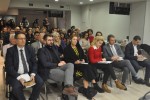
The Belgrade Centre for Human Rights (BCHR) presented its 2019 Annual Reports on Human Rights in Serbia and on the Right to Asylum in Serbia on Thursday, 27 February 2020.
The 2019 Human Rights in Serbia report was presented in the Belgrade Media Center by its editor, Dr. Vesna Petrović. Mr. Matthias Schikorsky, Second Secretary, Political Adviser and Human Rights Officer at the German Embassy in Belgrade and the authors of the Report, BCHR expert Mr. Dušan Pokuševski and reporter Mr. Ivan Protić, discussed the human rights situation in the country.
Dr. Petrović said that the human rights situation in Serbia has been deteriorating due to lack of dialogue in society and dwindling public trust in state institutions. She cited in example the offensive vocabulary the Serbian MPs have been resorting to in their qualifications of journalists, judges, actors and others who do not share their views, their failure to publicly debate the laws they were adopting and their adoption of leges speciales with corruptive provisions.
“We thought something would change when the (EU accession) talks on Chapter 23 opened but the fact that no-one has been appointed in lieu of Ms. Tanja Miščević, who stepped down as the head of the Serbian EU negotiation team in September 2019, speaks volumes. The public does not know who is negotiating on behalf of Serbia. Only two new Chapters were opened last year,” said Professor Petrović.
In the context of Serbia’s EU accession talks, Mr. Schikorsky said that human rights were still not at the level at which they should be, due to political influence on the media. He, however, qualified the new Media Strategy as a “light at the end of the tunnel“, indicating the Serbian Government’s resolve to address this issue and thus contribute to free elections. One of the Report co-authors, journalist Mr. Ivan Protić, said that the year-long deterioration of the situation on the media stage gained in intensity in the year behind us. “At least 110 incidents targeting reporters were registered, including a murder attempt. The Press Code of Conduct was violated 5,057 times in the second half of the year, one-sixth more than in the same period in 2018,” Protić said.
BCHR lawyer and Report co-author Dušan Pokuševski spoke about the right to privacy and the senior government officials’ disclosure of media in-house correspondence.
The 2019 Right to Asylum in the Republic of Serbia Report was presented by UNHCR Representative in Serbia Mr. Hans Friedrich Schodder and the authors of the Report, BCHR lawyers Ms. Anja Stefanović and Mr. Marko Štambuk.
The Report notes headway in the exercise of the right to asylum in Serbia in the reporting period, but warns that the asylum system is still far from being fully functional, especially since asylum seekers and refugees still largely depend on the assistance of NGOs, in the absence of systemic measures and efficient coordination among the relevant state authorities.
Mr. Štambuk said that asylum applications were filed by only 252 of the 12,973 aliens, who had expressed the intention to seek asylum in 2019. He explained that the intention to seek asylum entitles aliens to stay temporarily in Serbia legally until they continue their journey to other countries. He specified that most asylum claims were filed in 2019 by nationals of Iran, Afghanistan, Burundi, Iraq and Turkey. The Serbian Asylum Office granted asylum to 35 applicants in 2019. The BCHR’s Asylum Report builds on its legal professionals’ years-long experience in extending legal aid to asylum seekers and aliens granted asylum in Serbia. The 2019 Report provides an overview and analysis of the implementation of national regulations and international standards on asylum and of other administrative proceedings of relevance to integration in Serbia’s society. The data in the Report, covering the 1 January – 31 December 2019 period, were obtained from the UNHCR Office in Belgrade, the Serbian Ministry of Internal Affairs and the national Asylum Office. In partnership with the UNHCR, the BCHR has been extending legal aid to asylum seekers and aliens granted international protection in Serbia since 2012.
You may download annual reports: Human Rights in Serbia 2019 and Right to Asylum in Republic of Serbia 2019

















